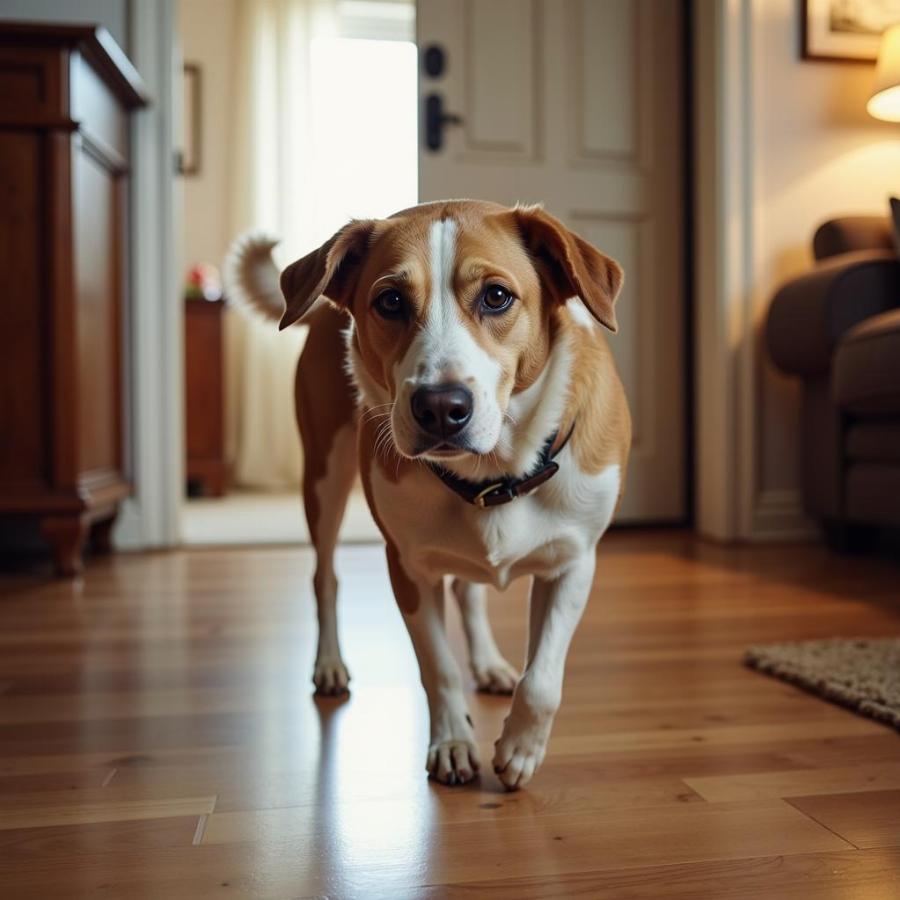Is your senior dog acting a little… different? Maybe they’re pacing at night, seem disoriented in familiar places, or aren’t as eager for their daily walk. While these changes can be attributed to normal aging, they can also be signs of canine cognitive dysfunction (CCD), sometimes referred to as dog dementia. This “does my dog have dementia quiz” will help you identify potential symptoms and guide you toward getting appropriate veterinary care for your furry friend.
Understanding Canine Cognitive Dysfunction
Just like humans, dogs can experience cognitive decline as they age. CCD affects a dog’s brain function, leading to changes in behavior, learning, and memory. It’s important to remember that aging itself isn’t a disease, and not every senior dog will develop CCD. However, understanding the signs can help you provide the best possible care if your dog does begin to show symptoms. This quiz isn’t a definitive diagnosis, but a starting point for a conversation with your vet.
Does My Dog Have Dementia? Take This Quiz
While this quiz is not a substitute for a professional veterinary diagnosis, it can help you assess whether your dog may be experiencing symptoms associated with CCD. Answer “yes” or “no” to the following questions:
- Does your dog seem disoriented or confused in familiar surroundings?
- Has your dog’s sleep-wake cycle changed significantly, with increased nighttime activity and daytime sleepiness?
- Have you noticed a decrease in your dog’s interest in activities they used to enjoy, such as walks, playtime, or interacting with family members?
- Does your dog seem anxious or restless, particularly in new or unfamiliar situations?
- Has your dog’s housetraining regressed, with accidents occurring inside the house?
- Does your dog have difficulty recognizing familiar people or pets?
- Does your dog seem less responsive to commands or cues?
- Has your dog become more vocal, with increased barking or whining?
- Does your dog pace aimlessly, especially at night?
- Have you noticed changes in your dog’s appetite or eating habits?
 Dog Showing Potential Signs of Canine Cognitive Dysfunction
Dog Showing Potential Signs of Canine Cognitive Dysfunction
If you answered “yes” to several of these questions, it’s crucial to schedule a visit with your veterinarian.
What to Expect at the Vet
Your veterinarian will perform a thorough physical exam and gather information about your dog’s medical history and recent behavioral changes. They may also recommend blood tests and other diagnostic procedures to rule out other medical conditions that can mimic CCD symptoms, such as thyroid problems, infections, or pain.
Diagnosing Canine Cognitive Dysfunction
There’s no single test to definitively diagnose CCD. The diagnosis is typically based on a combination of behavioral observations, ruling out other medical conditions, and the exclusion of other potential causes for the observed changes.
Caring for a Dog with CCD
While there’s no cure for CCD, there are ways to manage the symptoms and improve your dog’s quality of life.
Medication and Supplements
Your veterinarian may prescribe medications or recommend dietary supplements that can help support brain function.
Environmental Enrichment
Creating a stimulating and predictable environment can help reduce anxiety and confusion. This can include providing interactive toys, establishing a consistent daily routine, and making sure your home is safe and easy for your senior dog to navigate.
Dietary Considerations
A balanced diet rich in antioxidants and omega-3 fatty acids can support cognitive health. Your vet can recommend appropriate food choices for your senior dog.
What if It’s Not Dementia?
Many conditions can mimic CCD symptoms. Arthritis, vision or hearing loss, infections, and other medical issues can cause changes in behavior. That’s why a veterinary diagnosis is crucial.
How Can I Help My Dog?
Even if your dog doesn’t have CCD, supporting their cognitive health is important. Provide mental stimulation with puzzle toys, maintain a regular exercise routine, and offer a nutritious diet.
Conclusion
While facing a potential CCD diagnosis can be concerning, understanding the signs and seeking veterinary care are the best steps you can take. With proper management, you can help your senior dog live a comfortable and fulfilling life, even with cognitive decline. Don’t hesitate to contact your vet if you have any concerns about your dog’s behavior.
FAQ
- Is dog dementia the same as Alzheimer’s in humans? While similar, they are not the same disease. CCD shares some characteristics with Alzheimer’s but affects dogs differently.
- Can young dogs get dementia? CCD primarily affects senior dogs, though cognitive decline can rarely occur in younger animals due to other underlying conditions.
- Is there a cure for canine cognitive dysfunction? Currently, there is no cure, but treatments are available to manage the symptoms and slow the progression.
- How can I make my home safer for a dog with CCD? Remove obstacles, provide clear pathways, and consider using ramps or steps to assist with mobility.
- What kind of diet is best for a dog with CCD? A diet rich in antioxidants and omega-3 fatty acids is generally recommended. Consult your veterinarian for specific recommendations.
- How can I tell the difference between normal aging and CCD? While some behavioral changes are normal with age, significant changes in behavior, cognition, and housetraining warrant a veterinary check-up.
- How can I stimulate my senior dog’s mind? Interactive toys, puzzle feeders, and gentle training exercises can provide mental stimulation.
Further Reading
- Understanding Senior Dog Care
- Nutrition for Senior Dogs
- Common Health Issues in Older Dogs
Beaut Dogs is your trusted source for expert advice on all aspects of dog care, from breed selection to senior care. We provide reliable and in-depth information to help you navigate the wonderful world of dog ownership. For personalized guidance and answers to your specific questions, please contact us at [email protected]. Beaut Dogs is committed to helping you provide the best possible care for your beloved canine companion. Visit us at https://beautdogs.com.